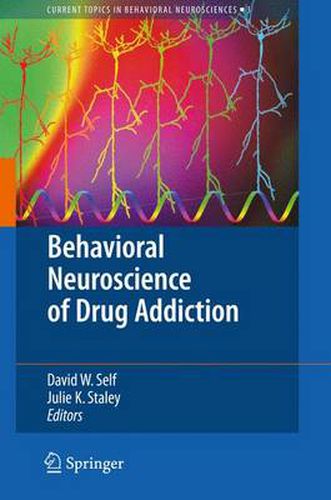Readings Newsletter
Become a Readings Member to make your shopping experience even easier.
Sign in or sign up for free!
You’re not far away from qualifying for FREE standard shipping within Australia
You’ve qualified for FREE standard shipping within Australia
The cart is loading…






This title is printed to order. This book may have been self-published. If so, we cannot guarantee the quality of the content. In the main most books will have gone through the editing process however some may not. We therefore suggest that you be aware of this before ordering this book. If in doubt check either the author or publisher’s details as we are unable to accept any returns unless they are faulty. Please contact us if you have any questions.
Drug addiction is a chronically relapsing mental illness involving severe motivational disturbances and loss of behavioral control leading to personal dev- tation. The disorder af?icts millions of people, often co-occurring with other mental illnesses with enormous social and economic costs to society. Several decades of research have established that drugs of abuse hijack the brain’s natural reward substrates, and that chronic drug use causes aberrant alterations in these rewa- processing systems. Such aberrations may be demonstrated at the cellular, neu- transmitter, and regional levels of information processing using either animal models or neuroimaging in humans following chronic drug exposure. Behaviorally, these neural aberrations manifest as exaggerated, altered or dysfunctional expr- sion of learned behavioral responses related to the pursuit of drug rewards, or to environmental factors that precipitate craving and relapse during periods of drug withdrawal. Current research efforts are aimed at understanding the associative and causal relationships between these neurobiological and behavioral events, such that treatment options will ultimately employ therapeutic amelioration of neural de?cits and restoration of normal brain processing to promote efforts to abstain from further drug use. The Behavioral Neuroscience of Drug Addiction, part of the Springer series on Current Topics in Behavioral Neurosciences, contains scholarly reviews by noted experts on multiple topics from both basic and clinical neuroscience ?elds.
$9.00 standard shipping within Australia
FREE standard shipping within Australia for orders over $100.00
Express & International shipping calculated at checkout
This title is printed to order. This book may have been self-published. If so, we cannot guarantee the quality of the content. In the main most books will have gone through the editing process however some may not. We therefore suggest that you be aware of this before ordering this book. If in doubt check either the author or publisher’s details as we are unable to accept any returns unless they are faulty. Please contact us if you have any questions.
Drug addiction is a chronically relapsing mental illness involving severe motivational disturbances and loss of behavioral control leading to personal dev- tation. The disorder af?icts millions of people, often co-occurring with other mental illnesses with enormous social and economic costs to society. Several decades of research have established that drugs of abuse hijack the brain’s natural reward substrates, and that chronic drug use causes aberrant alterations in these rewa- processing systems. Such aberrations may be demonstrated at the cellular, neu- transmitter, and regional levels of information processing using either animal models or neuroimaging in humans following chronic drug exposure. Behaviorally, these neural aberrations manifest as exaggerated, altered or dysfunctional expr- sion of learned behavioral responses related to the pursuit of drug rewards, or to environmental factors that precipitate craving and relapse during periods of drug withdrawal. Current research efforts are aimed at understanding the associative and causal relationships between these neurobiological and behavioral events, such that treatment options will ultimately employ therapeutic amelioration of neural de?cits and restoration of normal brain processing to promote efforts to abstain from further drug use. The Behavioral Neuroscience of Drug Addiction, part of the Springer series on Current Topics in Behavioral Neurosciences, contains scholarly reviews by noted experts on multiple topics from both basic and clinical neuroscience ?elds.